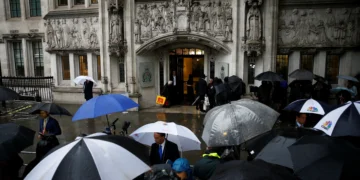- In a Q&A, MySpace founder Brad Greenspan explains his view on the role social media will have in the future of work, as well as the ways in which company acquisitions should not be conducted.
- Fractional CEOs—those who spend only a small percentage of their time on a particular company—are laughable and don’t motivate workers, Greenspan says.
- Greenspan believes Elon Musk’s attempted Twitter acquisition has set a precedent that other companies will look to in the future in order to see how their board should structure a transaction.
It’s clear social media usage is ever-evolving. While in its infancy it was used simply for entertainment purposes, it is now used for a plethora of other things—such monitoring employees, shopping, arguing with strangers online about politics, and job hunting.
While social media’s influence on the future of work is too large to comprehend, the politics behind running and trading such companies are even more complicated.
Brad Greenspan, the founder of MySpace, has immense insight into the complexities, challenges and opportunities of owning and running a social media giant—along with the obstacles involved in the buying and selling of such a company.
In a Q&A, Greenspan explains his view on the role social media will have in the future of work, as well as how company acquisitions should NOT be conducted.
Responses have been edited for length and clarity.
Allwork.Space: Do you have any predictions on how social media will play into the future of work?
Brad Greenspan: I think that the future of work is going to include people using online tools to communicate more efficiently.
Let’s say version 1.0 was instant messenger, and now more companies have started using Slack.
In the future, it seems that people are going to be making more use of these really interactive tools that allow them to collaborate with their coworkers, wherever their coworkers may be.
Allwork.Space: Elon Musk has said he only spent 5% of his time working on the Twitter acquisition or dedicating his time to Twitter. How much time did you spend when you were creating MySpace?
Brad Greenspan: I spent 110% of my time. That made me laugh when I thought of the prospect of Elon Musk only spending a fraction of his time dedicated to Twitter, and the prospect of Twitter closing that he would be part of the new generation of fractional CEOs.
If I was an employee, I would want a CEO who is going to motivate. How would a fractional CEO motivate you when they come in and say, “Hello, as you know, I’m only here for 25% of my time because I’ve got three other companies, but I want to make sure that you’re dedicating all of your time to Twitter, and you’re waking up and going to bed thinking about how we’re going to make Twitter a better company.”
And I just thought that sounds almost like a recipe for a comedy. The sequel to The Office is the fractional CEO.
Allwork.Space: Do you feel that a CEO of a public company should have a bigger obligation to shareholders than a CEO of a private company?
Brad Greenspan: Yes, because the obligation is the same in terms of fiduciary duty and loyalty.
In either case, they’re both a CEO of a corporation, which is going to be incorporated in a state, and that state typically calls for the same obligations, whether it’s private or public.
Allwork.Space: Do you think that the way that Twitter handled the proposed acquisition will impact how acquisitions like this will be handled in the future? Did Musk set up a precedent that might make tactics like this more common?
Brad Greenspan: I think that he is setting up a precedent, and I think that Twitter has mishandled it by not insisting that when they signed an agreement, it had to include a nondisparagement clause, or a clause that laid out a principle that Elon Musk could not use the Twitter platform to make announcements or disclose information about the transaction without giving Twitter a chance to review that communication and post a response concurrently.
They could have protected their shareholders. By not doing that, I think it creates an irrational situation in which the board breached their fiduciary duty and duty of loyalty to the shareholders by not putting in that sort of apparatus in the agreement, so that the company was protected from Elon Musk using their own platform against them.
The precedent the company has set is a bad one, and I think it’s going to be a precedent for future companies looking at what their board should do or how their board should structure a transaction in the right way, and not the wrong way as Twitter did.
Allwork.Space: Let’s talk about social media in general a little bit. We love to scream into the void about a lot of things—politics, personal issues—but are there actually ways social media can steer corporate practices or inspire workplace change?
Brad Greenspan: I think it certainly already does. A part of me wishes that it wasn’t having such a significant role, because it means that corporations are finding it sort of standard practice to monitor and surveil all the social networks.
My vision of community online and social networks has always been for people to be using it for entertainment purposes, so I think it would be absurd that all the corporations have found it standard practice to monitor everybody. I think they increasingly will, but I think that’s unfortunate.
People are becoming increasingly aware that their future employers or their current employers are reviewing everything that they post on a social network, and that makes them more hesitant and less likely to speak their mind and have freedom of expression and freedom of speech.



 Dr. Gleb Tsipursky – The Office Whisperer
Dr. Gleb Tsipursky – The Office Whisperer Nirit Cohen – WorkFutures
Nirit Cohen – WorkFutures Angela Howard – Culture Expert
Angela Howard – Culture Expert Drew Jones – Design & Innovation
Drew Jones – Design & Innovation Jonathan Price – CRE & Flex Expert
Jonathan Price – CRE & Flex Expert












